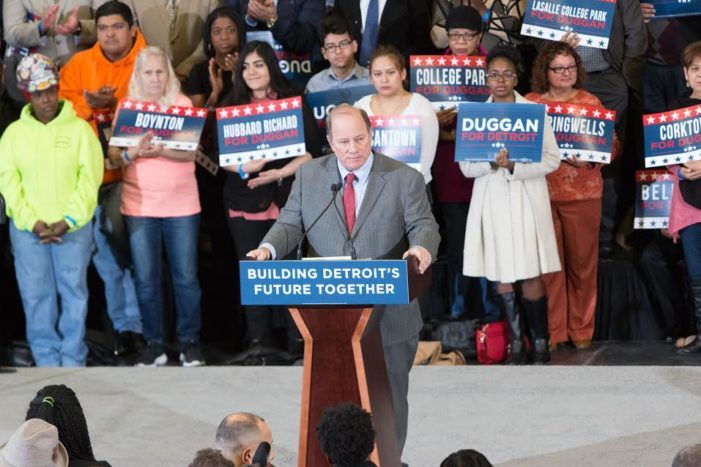
Pundits and agitators are trying to push Detroit Mayor Mike Duggan into installing a new pro-black business president and CEO at the Detroit Economic Growth Corp. following the resignation last month of Rodrick Miller. The implication is that the mayor has been pro-white corporate cozy in his attempts to kick start business investment and development.
I’m not one to rescue Mayor Duggan from allegations of playing favorites with white companies and indifference to this majority black constituency. He has his share of foibles and deficiencies. But there’s nothing to justify hanging an anti-black business noose around his neck.
Not up for debate is that blacks have generally been excluded from the bulk of new business opportunities, primarily in the downtown and Midtown areas of the city. But it’s no fault of Duggan. And for the most part, it’s hardly the fault of the mayors that preceded him.
In the 1920s during Detroit’s segregated history, blacks owned hospitals, hotels, pharmacies, clothing stores, grocery stores, nightclubs, and bowling alleys and more – mainly on the lower east side and primarily out of necessity. As housing covenants were lifted (provisions banning the sale of houses to blacks and Jews), black homebuyers were able to move west across Woodward.
Urban renewal ultimately and thankfully wiped out the enclave of “Black Bottom,” with its substandard living conditions and dilapidated buildings. Regrettably, much of the sustaining black businesses culture dissipated with integration.
Coleman A. Young took office in 1974. To his credit, Detroit’s first black mayor encouraged the black business class to make investments in the city. He urged them to purchase vacant downtown buildings, pool their collective resources, form strong companies and help achieve the dream of a predominately black-administered city becoming a mecca and model for economic success.
With few exceptions, his pleas fell on deaf ears.
Businessman Don Barden, one of the blacks Coleman Young elevated to underserved prominence with a cable contract, attempted to push the envelop with Mayor Dennis Archer.
When Archer was considering who should receive casino contracts, Barden launched an all-out media assault. He claimed he deserved one of the casinos because he was “black,” not because he was one of the best qualified. Archer ultimately awarded the contracts to three nationally known operators, but Barden represented an attitude that still exists today.
Under Mayor Kwame Kilpatrick, black businesses that tended to get a foothold had to be filtered through Maestro Associates, the consulting firm of his dad, Bernard Kilpatrick. Some, after receiving special treatment or surviving a strategic shakedown, were caught up in a federal RICO criminal probe that landed the mayor in prison with a sentence longer than some murders receive.
Corruption trumped black business progress.
By the time Dave Bing became mayor, there was only a sliver left of the economic pie and bankruptcy hovered over the city.
Despite laudable gains in some areas, the city continues to lose residents and tax base to the suburbs.
While pockets of development are evident, the overwhelming majority of Detroit’s neighborhoods are characterized by a soft real estate market, acute social distress, weak employment prospects and an unstable financial situation. General business markets are projected to remain poor for the foreseeable future.
Mayor Duggan attempted to tip the scale toward more black inclusion in the city’s recovery in the form of a $6.5-million set-aside in the form of business capital made available to black-owned small businesses. The Duggan-backed initiative turned out to be nothing more than political window dressing because many black businesses couldn’t meet loan requirements.
Black businesses should have figured out by now simply holding out an empty hand does not automatically result in a favorable response from government.
In fairness, there are a few promising black investment projects scattered throughout the city. But they have emerged from risk-takers who have been willing to put some skin in the game.
The Duggan administration must accept that a level playing field is best achieved by across-the-board regulatory relief and easing the tax burden on businesses of all kinds and entrepreneurs of all heritages.
Editor’s note: Bill Johnson is an award-winning freelance broadcast and print news journalist and former Detroit News columnist. He served as Public Affairs Officer for the Detroit Water & Sewerage Dept.; as CEO for the Wayne County Commission, 2003-2010; as press secretary for Wayne Co. Executive Bill Lucas, 1983 – 1986. Johnson, has been a frequent voice on Detroit radio and television. He runs his own political consulting firm, the Bill Johnson Group.
See TheHUB’s coverage of the Paradise Valley project.
Lead photo courtesy City of Detroit


